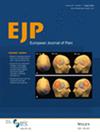Attachment in Young Adults With Chronic Pain: The Mediating Role of Cognitive Appraisals in the Relationship Between Attachment Security, Pain Coping and Functioning
Abstract
Background
Attachment styles can influence how individuals perceive and cope with chronic pain. This study examined the relationships between attachment security, pain coping and functioning in young adults with chronic pain, focusing on the mediating role of cognitive appraisals.
Methods
This cross-sectional study included 206 young adults attending university aged 17–29 with chronic pain (Mage = 19.24, SD = 2.03) and 346 without pain (Mage = 19.11, SD = 1.79). Participants completed measures assessing pain characteristics, attachment security, pain coping strategies, physical and social functioning and cognitive appraisals relating to bodily and social threat bias and pain catastrophising. SPSS PROCESS macro was used to test mediational hypotheses.
Results
Young adults with chronic pain had greater insecure attachment than controls (Mann–Whitney U = 41639.50, p < 0.001). Insecure attachment was significantly associated with poorer solution-focused coping and social functioning (r = −0.330 and − 0.355 respectively), and increased emotion-focused avoidance (r = 0.317). Social threat bias partially mediated the effects of attachment security on emotion-focused avoidance and social functioning. Pain catastrophising partially mediated the effects of attachment security on solution-focused coping and social functioning, and fully mediated its effects on emotion-focused avoidance. An indirect effect of attachment security on reframing and distraction was found via social threat and pain catastrophising.
Conclusions
Insecure attachment is heightened in young adults with chronic pain and may contribute to poorer pain coping and social functioning through cognitive appraisals, specifically social threat and pain catastrophising. These may be useful targets for intervention.


 求助内容:
求助内容: 应助结果提醒方式:
应助结果提醒方式:


